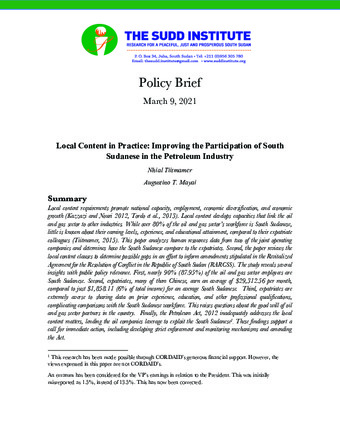Local Content in Practice: Improving the Participation of South Sudanese in the Petroleum Industry
Publication Summary
Local content requirements promote national capacity, employment, economic diversification, and economic growth (Kazzazi and Nouri 2012, Tordo et al., 2013). Local content develops capacities that link the oil and gas sector to other industries. While over 80% of the oil and gas sector’s workforce is South Sudanese, little is known about their earning levels, experience, and educational attainment, compared to their expatriate colleagues (Tiitmamer, 2015). This paper analyzes human resources data from two of the joint operating companies and determines how the South Sudanese compare to the expatriates. Second, the paper reviews the local content clauses to determine possible gaps in an effort to inform amendments stipulated in the Revitalized Agreement for the Resolution of Conflict in the Republic of South Sudan (RARCSS). The study reveals several insights with public policy relevance. First, nearly 90% (87.95%) of the oil and gas sector employees are South Sudanese. Second, expatriates, many of them Chinese, earn an average of $29,312.56 per month, compared to just $1,858.11 (6% of total income) for an average South Sudanese. Third, expatriates are extremely averse to sharing data on prior experience, education, and other professional qualifications, complicating comparisons with the South Sudanese workforce. This raises questions about the good will of oil and gas sector partners in the country. Finally, the Petroleum Act, 2012 inadequately addresses the local content matters, lending the oil companies leverage to exploit the South Sudanese. These findings support a call for immediate action, including developing strict enforcement and monitoring mechanisms and amending the Act.
Nhial Tiitmamer has served as the Director of the Environment and Natural Resources Program at The Sudd Institute where he is currently on leave to work with United Nations in South Sudan (UNMISS). He has served as an Adjunct Assistant Professor at the University of Juba where he has taught Environmental Economics, Natural Resources Economics and Environmental Sociology. Between November 2021 and November 2022, Nhial worked as Senior Environment Associate with the United Nations High Commissioner for Refugees (UNHCR) in Juba. Before returning from Canada in 2013, Nhial worked at Arletta Environmental Consulting in Calgary and at University of Alberta’s Augustana Campus in Camrose in Alberta, Canada. Nhial’s research focusses on natural resources governance, environmental protection, climate change, and sustainable energy. He was awarded in May 2023 by the Board of Directors of The Sudd Institute with Research Impact Award for policy impacts. Nhial holds a B.A. in Environmental Studies with a minor in English Literature from the University of Alberta and an M.Sc. in Sustainable Energy Development from the University of Calgary in Alberta, Canada.
Augustino Ting Mayai's Biography
Augustino Ting Mayai is the former Managing Director of the Sudd Institute. He is a founding Research Director of the same institution, serving in this capacity for a decade. He holds a Ph.D. in Sociology, with concentrations on demography and development from the University of Wisconsin-Madison. He currently studies how state effectiveness affects child health outcomes in South Sudan and Ethiopia. Dr. Mayai has written extensively on South Sudan’s current affairs. August is the current Chair (Statistician General) of the National Bureau of Statistics, Government of South Sudan.

